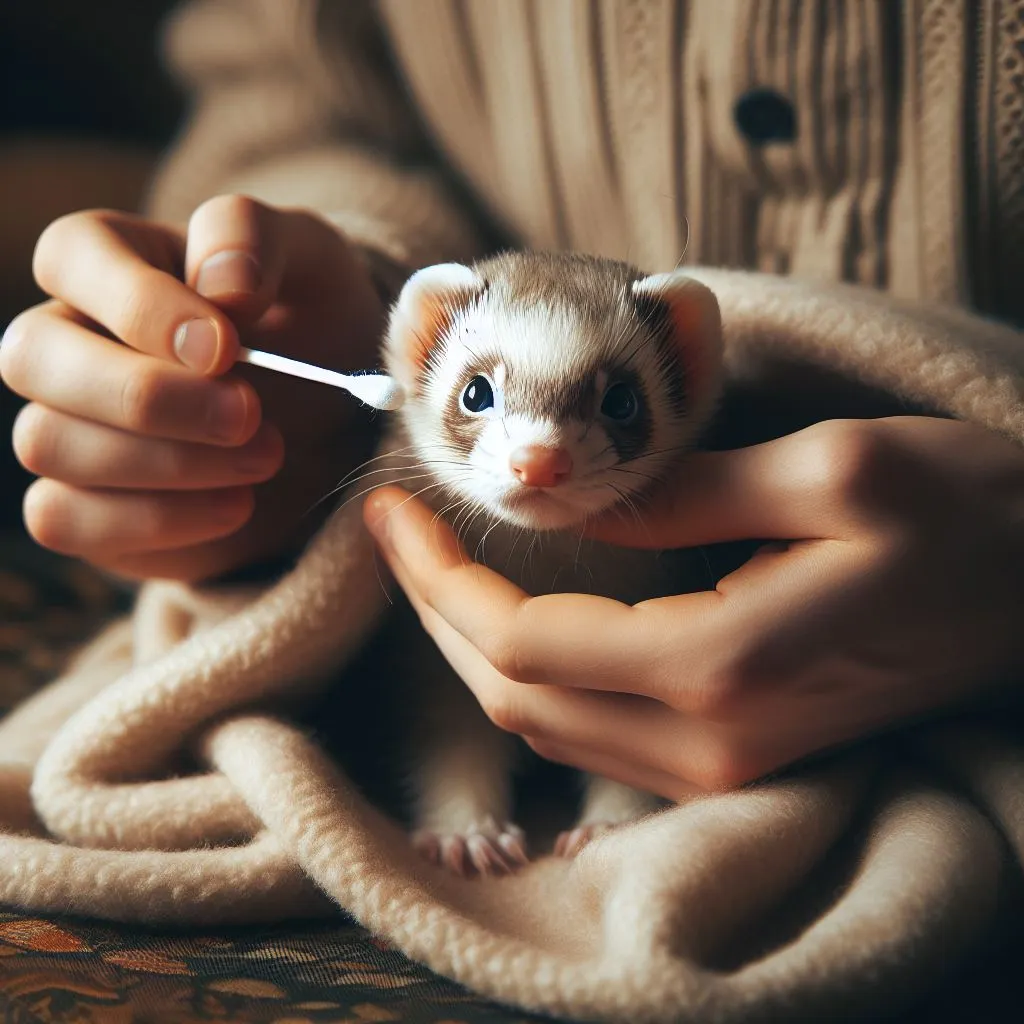Ferret Grooming: A Complete Guide With Tips & Techniques
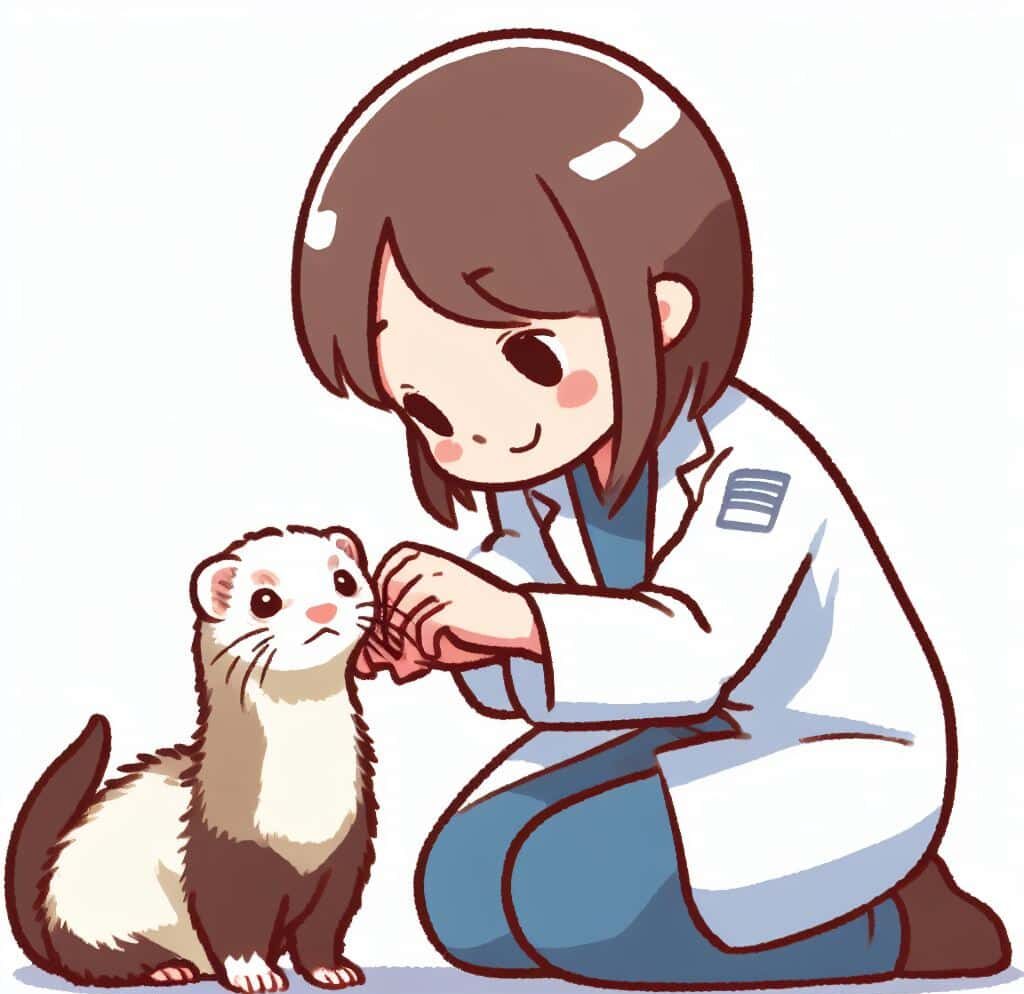
Ferret Grooming is the process of making your ferret more hygienic by using methods such as brushing the ferret’s fur, nail trimming, dental care, ear cleaning ,and bathing.
Proper grooming is crucial for the overall health and well-being of pet ferrets.
Just like cats, ferrets also need regular brushing to keep their fur clean and tangle-free.
Finding a professional groomer who specializes in pet ferrets can ensure that your furry friend receives the proper care they need.
Regular grooming by a pet groomer not only helps prevent matting but also keeps your pet ferret’s coat clean and healthy.
Plus, regular visits to the vet are essential for dog, cat, and ferret grooming.
Knowing how to care for ferrets properly includes grooming them, trimming their hair and nails, and cleaning their ears.
Topics Covered In This Article
What Are the Things Included In Ferret Grooming?
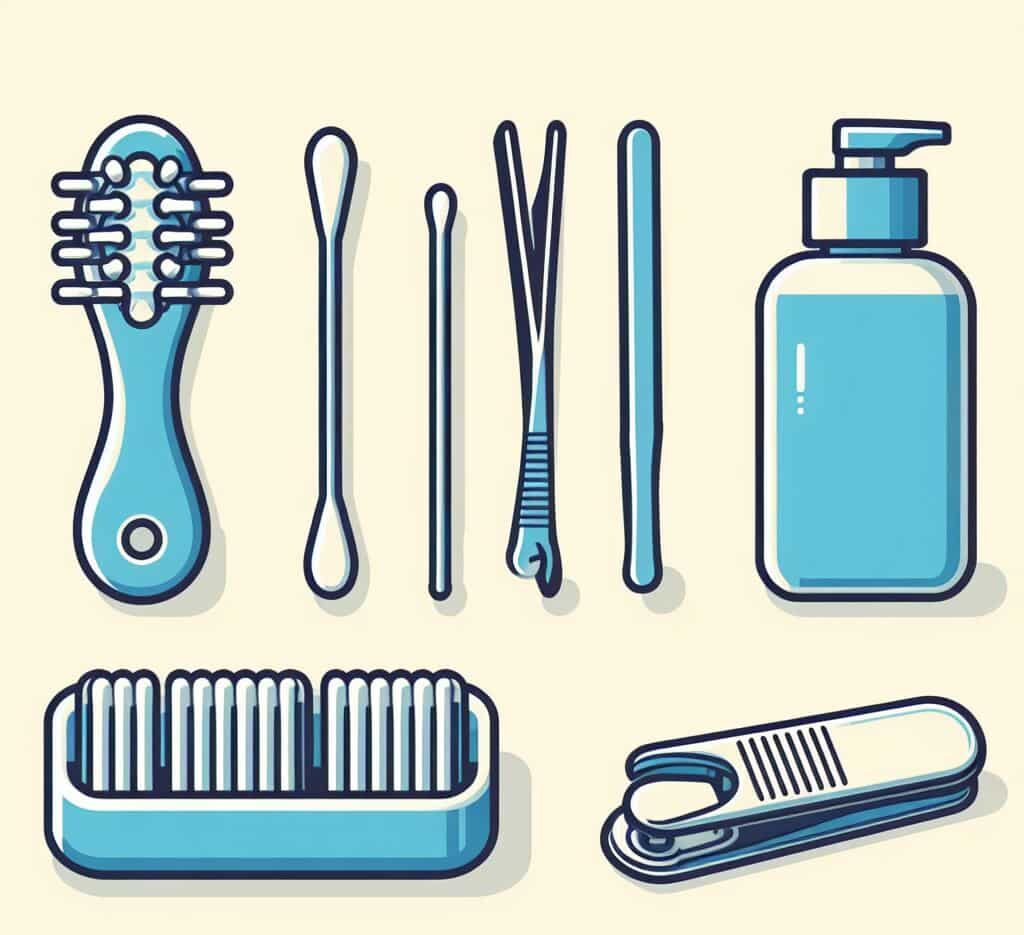
Brushing Your Ferret’s Fur
Brushing your ferret’s fur is an essential part of their grooming routine.
It’s important to regularly check and groom your animals, including fish, to keep their fur healthy and clean.
Grooming helps animals in multiple ways. It removes loose hair, prevents hairballs, and keeps their coat healthy and shiny. It is similar to how fish need water to survive.
Trimming Your Ferret’s Nails
Checking and trimming your ferret nails is crucial to prevent scratching and potential injury to the animal.
Over time, it is important to check and groom your ferret’s nails to prevent discomfort for both you and your pet.
By regularly trimming their nails, you can check and maintain a proper length, reducing the risk of accidental scratches.
Cleaning Your Ferret’s Ears
Cleaning your ferret’s ears is crucial for their hygiene as it prevents infections and wax buildup, which can cause discomfort and hearing issues.
Use a gentle ear cleaner specifically designed for ferrets to keep their ears clean and healthy.
Bathing Your Ferret
Bathing your ferret serves multiple purposes such as soothing itchy skin, especially during shedding seasons or if they have come into contact with something irritating. Bathing can help cool down your ferret on hot days.
However, it’s important to note that excessive bathing can strip away natural oils from their skin, so it should be done sparingly.
How To Do Nail Care for Ferrets?
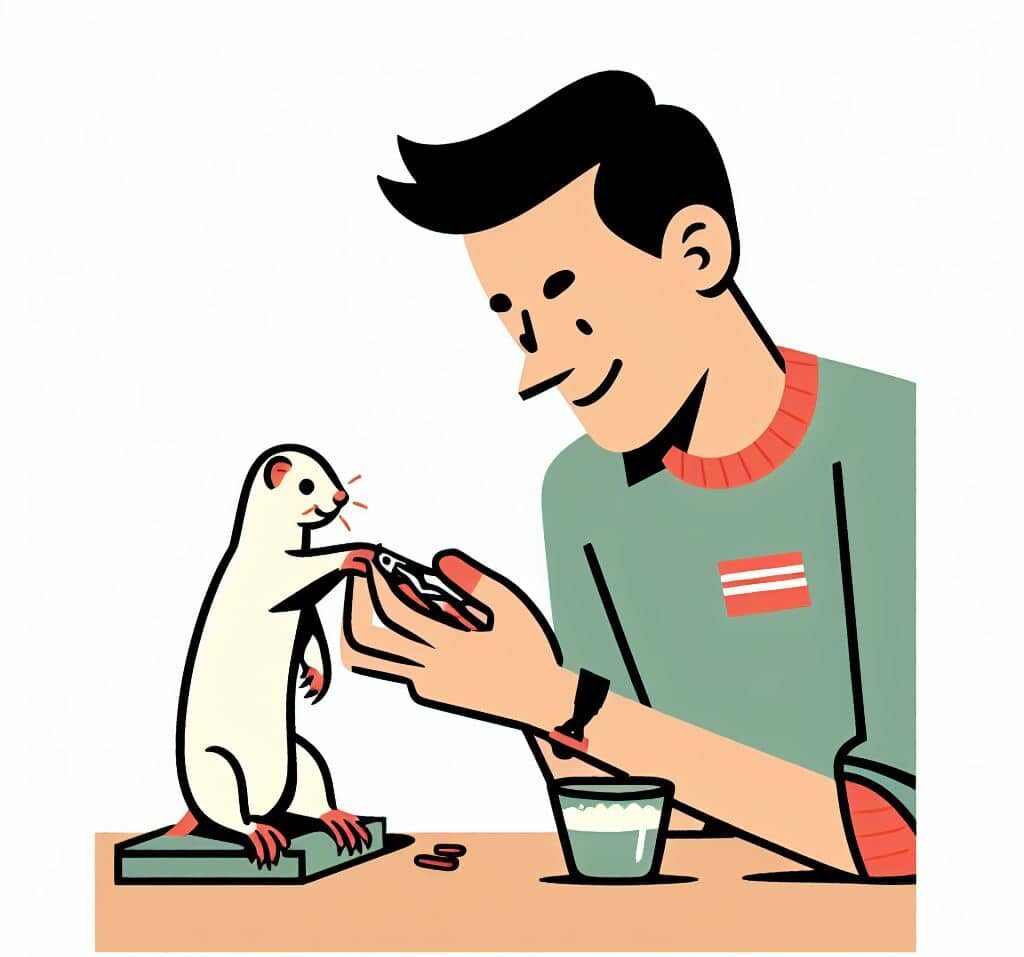
Regular nail cutting is essential to prevent overgrowth and discomfort in your ferret. It’s recommended to clip their nails once a week.
To get started, gather all the necessary supplies:
- Small animal nail clippers or human nail clippers
- Styptic powder to stop bleeding
- Treats like salmon oil, Ferretone, or Linatone
When trimming your ferret’s nails, it’s important to identify the clear part of the nail because that’s the part you’ll be cutting.
This section has a thin pink layer underneath it which is the blood vessel.
To distract your ferret during the process, place a treat on their belly and start cutting their nails.
If you find it challenging to trim your ferret’s nails on your own, don’t hesitate to ask for help from someone else.
In this case, have your friend scruff the ferret gently so that it becomes easier for you to cut their nails.
Remember that not all ferrets will need their nails trimmed every week; some may require it less frequently.
Monitor the length of their nails regularly and trim them as needed.
To Summarize
- Clip your ferret’s nails once a week.
- Gather all necessary supplies including nail clippers and styptic powder.
- Identify the clear part of the nail and avoid cutting into the blood vessel.
- Use treats to distract your ferret during nail trimming.
- Ask for assistance if needed and have someone scruff the ferret gently.
- Monitor nail length regularly and trim as required.
By following these steps and providing regular maintenance, you can ensure that your ferret remains comfortable and happy.
How To Do Dental Care for Ferrets?
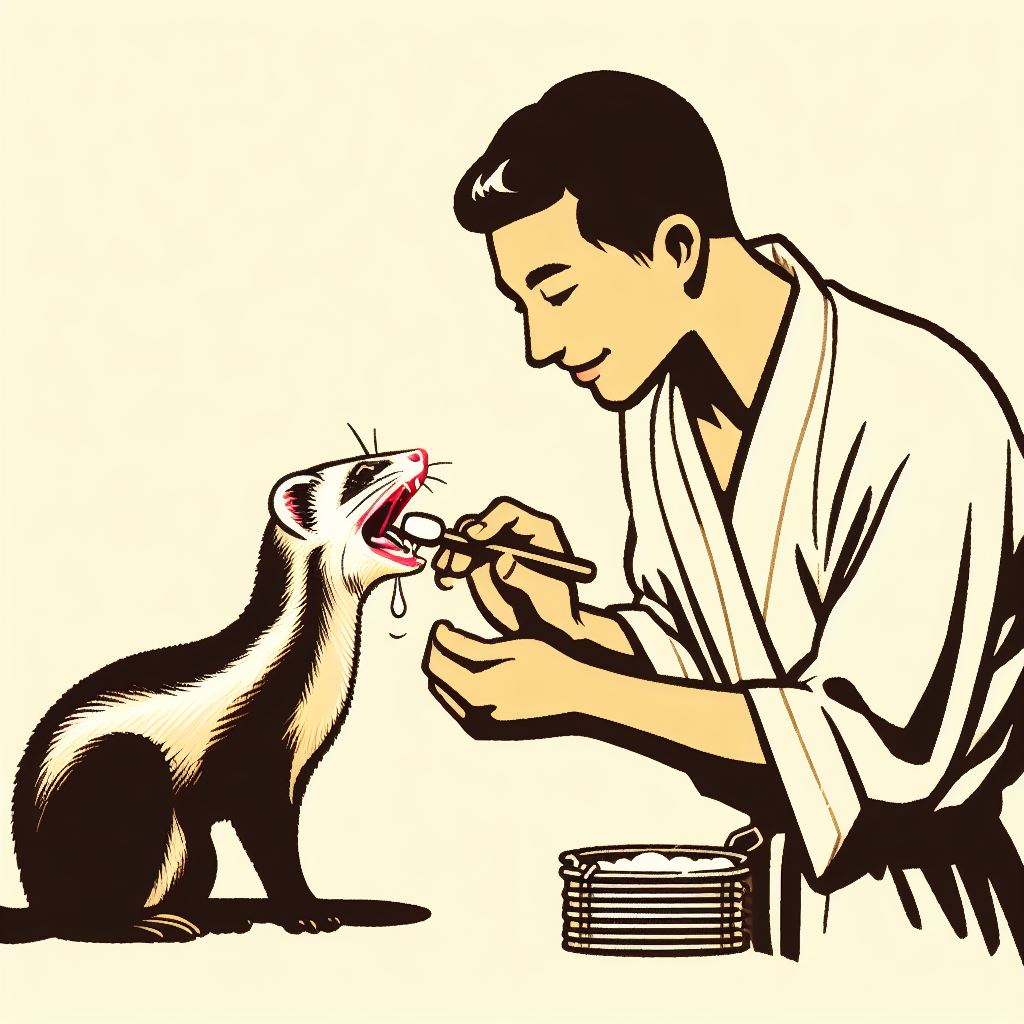
Proper dental care is crucial for maintaining the oral health of your pet ferret.
Here are some important tips to ensure their teeth and gums stay healthy:
Use a Pet Toothbrush and Toothpaste
Avoid using human toothpaste, as it contains high levels of fluoride that can be harmful to ferrets. Instead, opt for a pet-specific toothbrush and toothpaste.
Soft Foods Over Crunchy Kibbles
Prefer giving your ferret soft foods over crunchy kibbles. Soft foods are gentler on their teeth and reduce the risk of dental damage.
Massage Before Brushing
Before brushing your ferret’s teeth, gently massage its cheeks and mouth to get it used to being touched in that area.
Introduce Toothpaste Gradually
Start by brushing without any toothpaste, then gradually introduce a small amount of toothpaste for your ferret to taste. Eventually, you can proceed with regular brushing.
Increase Session Time Gradually
Begin with short brushing sessions and gradually increase the duration up to 2 minutes. This helps your ferret become accustomed to the process.
Check for Dental Problems
While brushing, keep an eye out for signs of dental problems such as deep yellow stains or obvious damage like chipped or broken teeth.
Provide Dental Treats
Occasionally offer dental treats specifically designed for ferrets. These treats can help maintain their oral hygiene between brushings.
Consider Professional Cleaning
Even with regular brushing, it is recommended to take your ferret to a veterinarian every 1 to 3 years for a professional dental cleaning.
Chew Toys and Dental Treats
Provide chew toys or dental treats that encourage chewing. This helps keep their teeth clean by reducing tartar buildup and promoting healthy gums.
Remember, while it may be challenging at first, with patience and consistency, your ferret will become more comfortable with having its teeth brushed.
By following these dental care practices, you can ensure your ferret’s oral health and overall well-being.
How To Do Ear Cleaning for Ferrets?
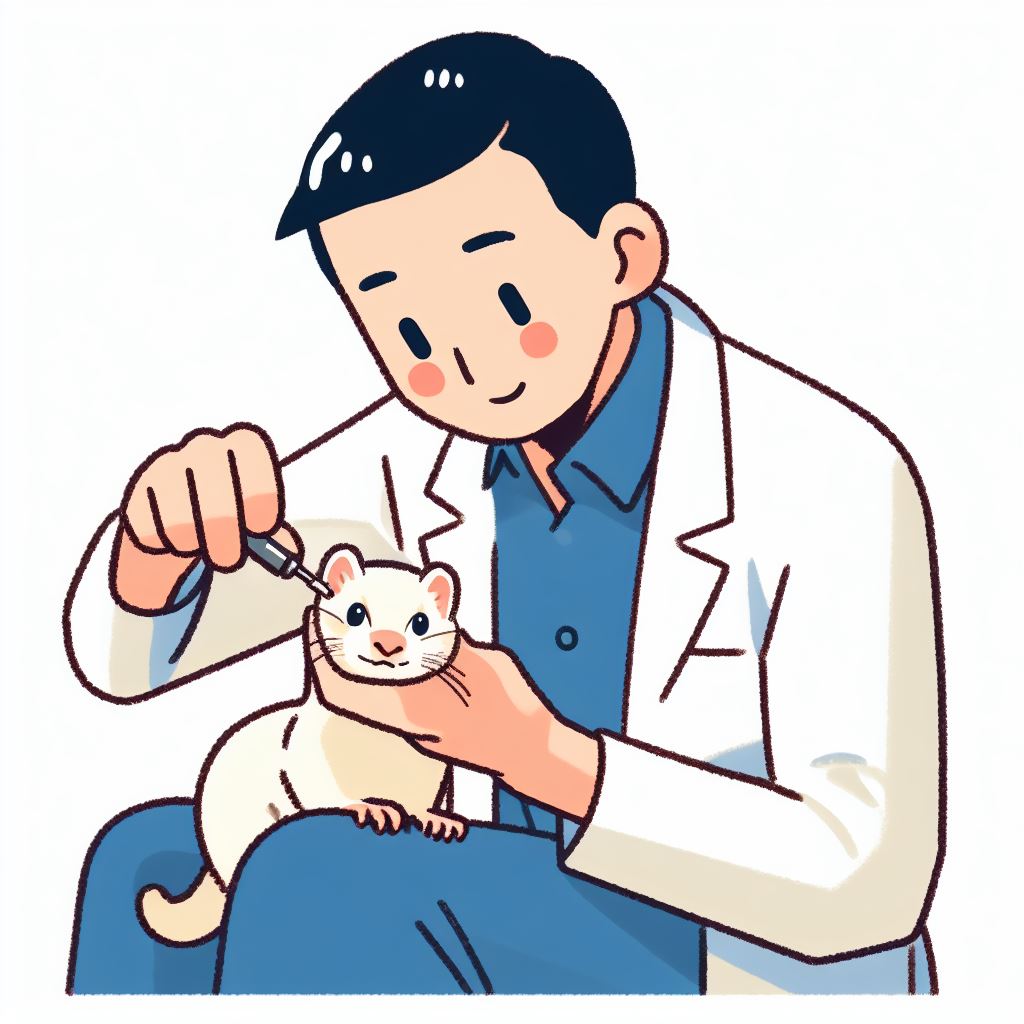
Cleaning your ferret’s ears helps to reduce odor, prevents ear mites, and protects against various ear infections. Having a proper ear cleaning routine can also help reduce ferret smell.
Common Ear Problems in Ferrets
Ferrets can experience several ear problems, including:
- Wax buildup on the outer, middle, and inner ear.
- Ear mites.
How Often Should You Clean Your Ferret’s Ears?
It is recommended to clean your ferret’s ears once a month to maintain their overall hygiene and prevent any potential issues.
What You’ll Need
To clean your ferret’s ears properly, you will need:
- Ear cleaning solutions specifically designed for ferrets such as the Marshall Pet Ferret Ear Cleaning Solution
- Cotton swabs or cotton wool.
- Treats to distract and reward your ferret during the process.
Steps to Clean Your Ferret’s Ears
Follow these steps to safely clean your ferret’s ears:
- Properly handle your ferret or seek assistance from someone else if needed.
- Begin by cleaning the outer part of the ear to remove any visible debris using a cotton swab or cotton wool.
- If the ear appears very dirty, you may use a few drops of ferret-specific ear cleanser to help remove stubborn dirt or wax buildup. Be cautious not to use too many drops as it can harm your ferret.
- Gently wipe away any excess cleanser using a cotton swab or cotton wool. Avoid pushing the swab too far into the ear canal.
- Offer treats as a distraction and reward after completing each step.
When Should You Seek Veterinary Care?
It is important to monitor your ferret’s ears regularly for any signs of concern.
If you notice dark wax, crust, or excessive scratching, or if your ferret appears withdrawn or uncomfortable during the cleaning process, it is advisable to consult a veterinarian for further examination and guidance.
How To Bathe Your Ferret?
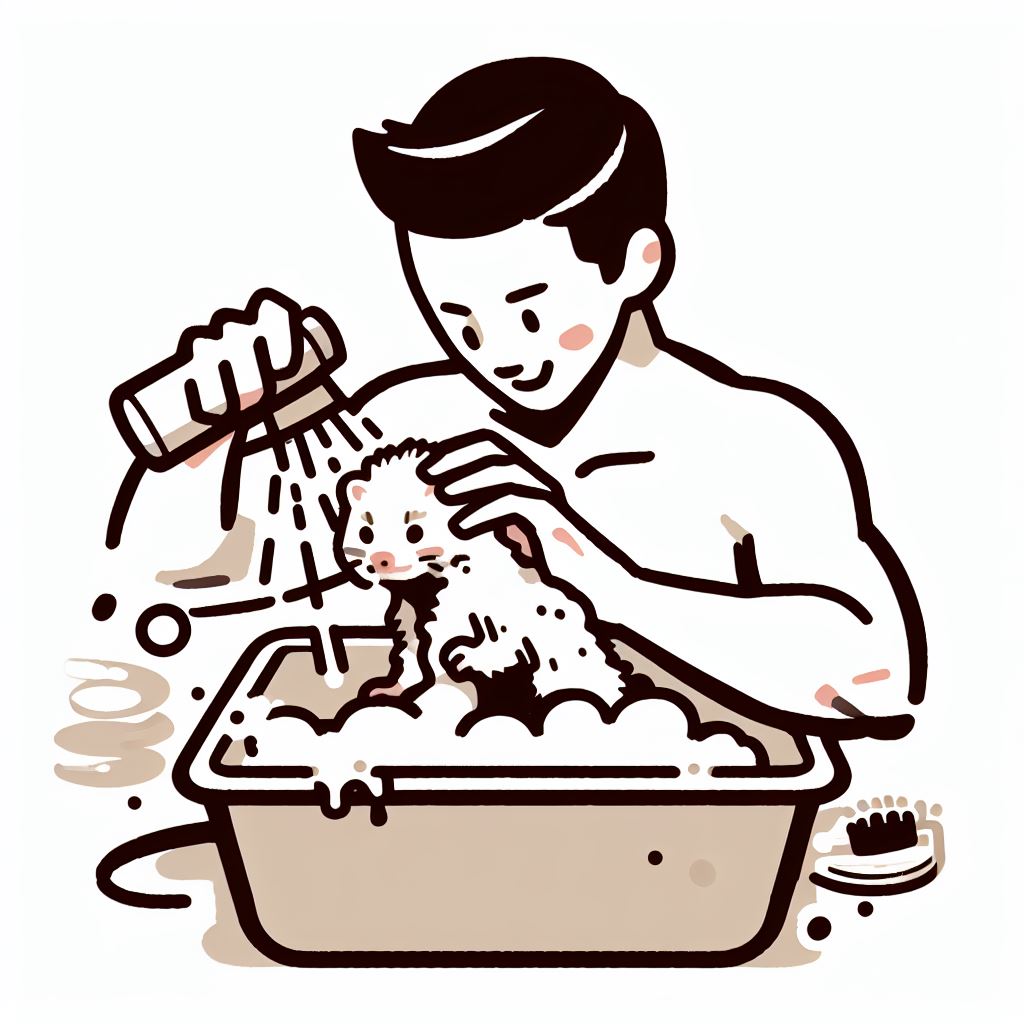
Bathing your ferret is an essential part of their grooming routine as it can help to reduce their smell but also keeps them clean and looking their best.
However, it’s important to remember that bathing should be done correctly and in moderation.
Related: The 7 Best Air Purifiers for Ferret Odor 2023 | Tested & Reviewed
How Often Should You Bathe Your Ferret?
It is recommended to bathe your ferret only once a month. Frequent bathing can strip their fur of its natural oils, causing the oil glands to overproduce and resulting in a stronger odor.
It’s important to note that a ferret’s smell is often more related to their bedding, cage, and litter boxes than the ferret itself. Choosing the best litter boxes and litter will ensure that your ferret smells good.
Also, cleaning the ferret cage daily, weekly ,and annually has shown to reduce ferret smell according to many ferret owners.
So, addressing these factors may help alleviate any unpleasant odors. Ferret owners also use air purifier to reduce ferret odor.
Overbathing can also lead to skin issues such as itchiness and infections caused by parasites like fleas, mites, and ticks.
What Is the Right Equipment For Bathing A Ferret?
When selecting products for bathing your ferret, opt for shampoos specifically made for them. These shampoos are formulated with their unique needs in mind.
If your ferret has a flea problem, you can choose a shampoo that effectively kills fleas.
You may consider using a conditioner designed specifically for ferrets after shampooing. This can help keep their coat soft and shiny.
To dry your ferret after the bath, use a towel instead of a blow dryer as excessive heat can be harmful to them.
Our Recommendation: Petpost | Ferret Shampoo

- Odor Lock Technology to eliminate bad smell.
- Natural Safflower Oil Formula.
- It helps to have Healthy, Shiny Skin and coat.
What Are the Steps To Bathe A Ferret?
The following are the steps to bathe a ferret
- Create a comfortable bathing space where your ferret feels secure.
- Fill the tub or basin with shallow water so they don’t feel overwhelmed.
- Introduce some of their favorite toys into the bath area to help them relax.
- Wet your ferret’s fur thoroughly, making sure the water is at a comfortable temperature (around 101-103 degrees Fahrenheit).
- Gently apply the ferret shampoo to their back and massage it into their coat.
- Pay special attention to washing their tail and abdomen.
- Be careful not to get soap in their eyes or mouth.
- Rinse off all the shampoo completely, ensuring there is no residue left on their skin.
- If using conditioner, repeat the same steps as with the shampoo.
- Rinse their head carefully, avoiding getting any shampoo near their eyes.
- Refill the bathing space with fresh water at the same temperature as before for a final rinse.
- Make sure there is no soap residue remaining on your ferret’s skin before taking them out of the bath.
What Is the Importance of Regular Grooming for Ferrets
The importance of regular grooming for ferrets is to prevent various health issues and maintain it’s overall appearance as well.
By taking the time to groom your ferret regularly, you are ensuring that they stay clean, comfortable, and free from common problems such as matting, overgrown nails, dental diseases, and ear infections.
To keep your ferret’s coat in top condition, make sure to brush them at least once a week using a soft-bristled brush or a specially designed ferret brush.
This will remove loose hair and prevent matting.
Regular nail trims are crucial to prevent overgrowth which can lead to discomfort or injury.
Dental care is often overlooked but plays a vital role in maintaining good oral hygiene for your furry friend.
Regularly inspect their teeth and provide appropriate chew toys to help keep them clean.
Understanding your ferret’s behavior and body language is key during grooming sessions.
Take note of any signs of distress or discomfort and adjust your approach accordingly.
Remember to be patient and gentle throughout the process to create a positive experience for both you and your ferret.
FAQs
No, it is not recommended to use human grooming products on your ferret.
Ferrets have sensitive skin that requires specific products formulated for their needs.
Human shampoos or soaps may contain ingredients that can be harmful to them.
Ferrets generally do not require frequent bathing unless they have gotten themselves particularly dirty or smelly.
Bathing them too frequently can strip away natural oils from their skin and cause dryness.
Aim for bathing them every few months or as needed.
Yes, you can trim your ferret’s nails at home.
However, it is important to be cautious and use proper nail clippers designed for small animals.
If you are unsure or uncomfortable doing it yourself, consult a veterinarian or a professional groomer.
To clean your ferret’s ears, use a gentle ear cleaner specifically made for ferrets.
Moisten a cotton ball with the cleaner and gently wipe the visible part of their ear canal.
Avoid inserting anything into their ear canal as it can cause injury.
If your ferret resists grooming or becomes aggressive during the process, it is best to seek guidance from an experienced veterinarian or animal behaviorist.
They can provide advice tailored to your specific situation and help you address any underlying issues causing the resistance.
Last Updated on 28 February 2024
Waman Nuka is a seasoned wordsmith and a passionate animal enthusiast with decades of experience in the world of animal care. With a deep love for all creatures great and small, Waman’s journey in the realm of animals started as a young boy exploring the lush forests surrounding his childhood home.


